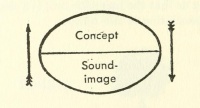Abstraction
From The Art and Popular Culture Encyclopedia
![Diagram of the human mind, from Utriusque cosmi maioris scilicet et minoris metaphysica, page 217[1] by Robert Fludd](/images/thumb/200px-Diagram_of_the_human_mind,_from_Robert_Fludd_(1574-1637),_Utriusque_cosmic_maioris_scilicet_et_minoris_metaphysica.jpg)
Diagram of the human mind, from Utriusque cosmi maioris scilicet et minoris metaphysica, page 217[1] by Robert Fludd
|
Related e |
|
Featured: |
Abstraction is the process of generalization by reducing the information content of a concept or an observable phenomenon, typically in order to retain only information which is relevant for a particular purpose. For example, abstracting a leather soccer ball to a ball retains only the information on general ball attributes and behaviour. Similarly, abstracting happiness to an emotional state reduces the amount of information conveyed about the emotional state.
[edit]
See also
- Abstraction (art)
- Abstract structure
- Abstract (summary)
- Abstract interpretation
- Abstract object
- Gottlob Frege
- Hypostatic abstraction
- Leaky abstraction
- Model (abstract)
- Object of the mind
- Charles Sanders Peirce
- Platonic realism
- Symbolism (disambiguation)
Unless indicated otherwise, the text in this article is either based on Wikipedia article "Abstraction" or another language Wikipedia page thereof used under the terms of the GNU Free Documentation License; or on research by Jahsonic and friends. See Art and Popular Culture's copyright notice.


